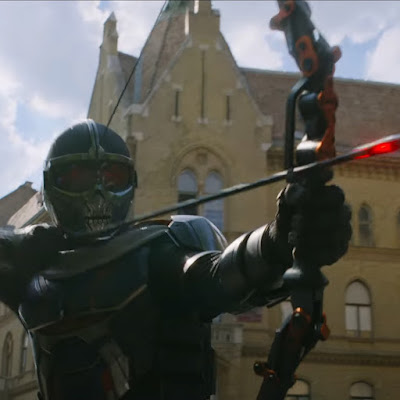This could be superspy Black Widow's toughest assignment yet. Two years ago, the Marvel Cinematic Universe crescendoed in an interstellar Endgame bursting with a galaxy of superhero stars. After a lengthy COVID-enforced hiatus, how can a spy flick with barely any superpowers measure up? It's an MCU mission impossible requiring the right agents for the assignment. And by surrounding Scarlett Johansson with a pitch-perfect cast of new faces, Black Widow reveals what Marvel does best.
And death, in the MCU, can be as much a financial concern as a mortal one, what with the younger, cheaper stars waiting in the wings with their freshly signed multi-picture contracts. Black Widow, which was directed by the Australian filmmaker Cate Shortland (Lore), is a barbed farewell to Natasha that also serves as a more enjoyable introduction to her replacement, Yelena (Florence Pugh). Yelena spent three years of her childhood living undercover in Ohio, The Americans-style, with Natasha and their “parents,” Melina (Rachel Weisz, criminally underused) and Alexei (a hammy David Harbour). A fellow survivor of the Red Room, the Soviet-born training and brainwashing program that made Natasha who she is, Yelena is in hiding herself after being freed from its control. She’s as formidable as her temporary older sibling while being earthier, funnier, and more naïve, and Pugh is such a bright, robust presence in the film that, as fun as she is, it’s also hard to think about how much of her next few years will be consumed by her obligations to this role. Natasha and Yelena begrudgingly join up to take down the Red Room, which has quietly kept operating under the control of Dreykov, whom Ray Winstone plays as a kind of evil, Russian-esque Béla Károlyi.
Ahead to just after “Captain America: Civil War,” when Natasha is on the run from her own government, underground after violating the Sokovia Accords. While she’s off the grid, she receives a package from Yelena, who is suffering through her own forced exile after discovering a substance that releases the Widows from their chemical subjugation. It’s very intentionally a reversal of the super-soldier serum concept that drove the action of projects like “The Falcon vs. the Winter Soldier.” Wherein Bucky Barnes stories often centered on vials that could make ordinary men into killing machines, “Black Widow” centers on vials that can turn killing machines back into ordinary women. Yelena sends a case of the vials to her sister, knowing it will bring her to a safe house in Budapest. From there, they are forced to break Alexei, aka The Red Guardian, out of prison and eventually reunite with the Black Widow who really made them, Melina.
Black Widow isn't as grittily inventive as the brutal, stunt-filled fights of Charlize Theron's similar espionage punch-up Atomic Blonde, or as seductively stylish as recent Bond films like Skyfall. And it remains to be seen if Black Widow's set pieces are as indelible as any stunt in the Mission: Impossible series -- or even Marvel's own memorable moments like Winter Soldier's elevator fight.
Still, director Cate Shortland takes the spy-on-spy action to the eye-popping next level. Even with no superpowers at play, each relatively grounded fistfight or foot chase quickly dials up to entertainingly ridiculous proportions. It isn't Fast and Furious 9 level of physics-defying ludicrousness (thankfully), but big scenes like an icebound prison break are exhilaratingly heightened enough to be worthy of the big screen.
On that note, hardcore fans of Romanoff may be unhappy how much spotlight she cedes here to the other members of her family, particularly Red Guardian and Yelena, but both actors are good enough that complaints shouldn't land. Harbour’s take on Russia’s version of Captain America is a clever one, finding just the right balance of humor and bravado—countering his performance here to his one in this week’s “No Sudden Move” reveals a significant range for an actor who feels like he’s on the verge of a remarkable decade of work. However, the film really belongs to Pugh, who nails every single line reading in a project that’s clearly designed to hand the baton off from Johannson to Pugh, who will appear in Disney+’s “Hawkeye,” in much the same way that Captain America’s shield went from Steve Rogers to Sam Wilson. Pugh proves more than up for the challenge, finding just the right shades of strength and vulnerability. It’s a top tier MCU performance and the film’s MVP.
As with a lot of the MCU, the third act here gets a little cluttered and repetitive but then the film recovers with a remarkable final action sequence that sends characters and debris hurtling through the sky (an MCU staple but Shortland’s choreography makes it feel urgent again). It’s ultimately a film that works on its own terms, a long-delayed enriching of the story of a beloved character that will make her ultimate sacrifice in “Avengers: Endgame” feel even more powerful in hindsight. Every blockbuster this Summer is being touted as the sign that the world is back to normal—“Black Widow” is more a reminder of what fans loved before it shifted off its axis.
From opening flashback to post-credits scene, everyone dons skintight superspy outfits and it's off around the world for an adventure in the style of Bourne and Bond, complete with rooftop snipers, motorbike stunts and hidden supervillain lairs. A Q-style quartermaster even doles out help along the way, while a remorseless masked henchman makes things difficult.
Black Widow is out now in the UK and hits US theaters today, Friday July 9. It's also available to stream on Disney Plus today for a $30 Premier Access fee. If you don't want to pay, it'll be free to all subscribers Oct. 6.







Objavi komentar